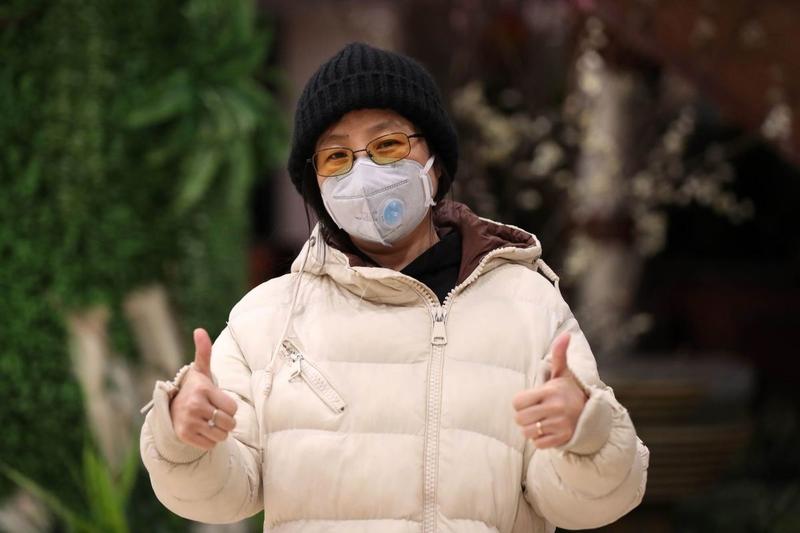 Liu Kun. (PHOTO PROVIDED TO CHINA DAILY)
Liu Kun. (PHOTO PROVIDED TO CHINA DAILY)
On Wednesday morning, the once deserted streets of Wuhan, Hubei province, the Chinese city hit hardest by the novel coronavirus outbreak, started to come back to life after its 76-day lockdown was lifted.
The sight of a long-forgotten traffic jam on my way to an interview almost made me cry for joy.
However, I was still wondering if everything in Wuhan was really back to normal and how its residents were living.
As the emergence of asymptomatic infections and recovered patients who test positive pose new risks, the city government has requested that people maintain their vigilance against the epidemic and that control measures in residential areas should not be relaxed, adding that "opening the city does not mean opening households".
Against this backdrop, I interviewed people in several residential communities in the city on Wednesday to learn more about the current situation.
It is precisely because of their day-to-day contribution that this heroic city has the possibility of victory and this heroic nation can see the light of day
After the interviews, I found that residential community workers are still on alert.
Although the community management work is not that complicated, it requires workers to have a strong sense of responsibility-including meticulousness, patience and prudence-which was especially necessary during the outbreak.
Only by insisting on the repetition of endless trivial tasks can they ensure each and every resident's safety.
While not among those who joined the fight in hospitals, they are also heroes because they remained on duty and implemented every detailed order from the government.
It is precisely because of their day-to-day contribution that this heroic city has the possibility of victory and this heroic nation can see the light of day.
Hongda Plaza, a commercial complex in downtown Wuhan comprised of residential areas, office buildings, hotels and shops, has more entrances and exits than other areas and faces more challenges in terms of virus prevention and control.
Liu Ying, its property manager, said that most staff members who went home before Chinese New Year hurriedly returned to their posts, and many people had still not taken a break.
At a gate to a community, security guards were still strictly inspecting residents when they entered and left, confirming identities, taking temperatures and making sure they wore masks.
"We recommend residents do shopping online," Liu said. "For those elderly people unfamiliar with the internet, our staff members will do grocery shopping for them.
"A temporary vegetable stand not far from the gate was also set up for convenience. If they don't need to go out, people should stay at home."
In another community, Feng Boxin, a Beijing resident who came to Wuhan with two children and her husband to visit his relatives but ended up being stuck in the city, said they hadn't been out for four months.
"We have no problem with purchasing daily necessities thanks to the management work of my community," she said. "They helped rid us of panic."
She said the only thing that gives her a headache is her two children, one a primary school student and the other in kindergarten.
"The disruptive children are inventing new ways to make trouble for me at home," she said. "When the epidemic is over, I will go out and eat a bowl of hot dry noodles!"
Chen Hongxing, a 58-year-old inspector in Dongxihu district, has been working in Feng's community since Feb 13. He works from 8:30 am to 7 pm on work days.
"Despite the end of the lockdown, communities are still under strict control," he said. "Only people who need to go to work or buy daily necessities can go out. Now, with more people having resumed work in a community with around 900 households, our workload has increased."
During the interview, the sun shone brightly and the temperature was above 20 C, but Chen still wore his thick protective gear.
ALSO READ: 3 local infections among 89 new cases on Chinese mainland
"I wear it because I want to give people some psychological hints that the epidemic has not ended," he said. "We need to explain to some of the residents that they should not relax their guard."
Chen said that, as a Party member, he was doing what he should, with no excuse to shirk his responsibilities.
Xu Xintong, a 24-year-old student from Wuhan University, has been working as a volunteer in her community since February.
The Wuhan native was unable to return to school during the outbreak and signed up for the community's volunteer team.
"I love this city and hope it returns to its original prosperity as soon as possible with the help of my meager strength," she said.
READ MORE: Meeting calls for enhanced prevention measures
These ordinary people-living, working and studying in the city-composed a heroic chapter in the anti-virus fight with love.
Before the epidemic, they were the most ordinary of people. As the epidemic winds down, they are the heroes behind the masks.
Li Hongyang contributed to this story.


